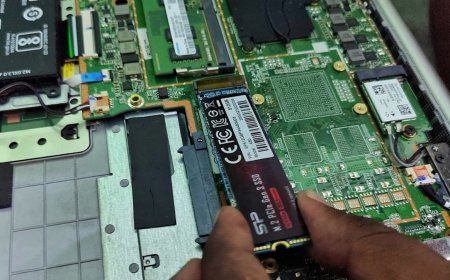How to Find Oakland Guitar Lessons
How to Find Oakland Guitar Lessons Learning to play the guitar is one of the most rewarding musical journeys anyone can undertake. Whether you're drawn to the soulful strumming of folk, the blistering riffs of rock, or the intricate fingerpicking of classical, the guitar offers endless creative possibilities. For residents of Oakland, California—a city rich in musical heritage, diverse cultures, a
How to Find Oakland Guitar Lessons
Learning to play the guitar is one of the most rewarding musical journeys anyone can undertake. Whether you're drawn to the soulful strumming of folk, the blistering riffs of rock, or the intricate fingerpicking of classical, the guitar offers endless creative possibilities. For residents of Oakland, California—a city rich in musical heritage, diverse cultures, and vibrant arts communities—finding the right guitar lessons can be both exciting and overwhelming. With countless instructors, studios, and online options available, knowing how to navigate the landscape is essential to finding lessons that align with your goals, learning style, and budget.
This guide is designed to help you confidently locate high-quality, personalized guitar lessons in Oakland. From identifying your learning objectives to evaluating instructors and leveraging local resources, you’ll walk away with a clear, actionable roadmap. Whether you’re a complete beginner or an intermediate player looking to refine your technique, this tutorial ensures you make informed decisions that lead to lasting progress.
Step-by-Step Guide
Define Your Learning Goals
Before searching for guitar lessons, take time to reflect on why you want to learn. Are you aiming to play your favorite songs for friends and family? Do you aspire to write your own music? Are you preparing for performances or auditions? Your goals will directly influence the type of instruction you need.
Beginners often benefit from structured curricula that cover basic chords, rhythm, and music theory. Intermediate players may seek specialized training in fingerstyle, improvisation, or genre-specific techniques like blues bending or metal palm muting. Advanced musicians might look for mentors who can help with composition, recording, or performance coaching.
Write down three specific goals. For example: “Learn to play ‘Wonderwall’ in four weeks,” “Develop fingerpicking skills for folk songs,” or “Build confidence to perform live at an open mic.” Having clear objectives helps you evaluate instructors and programs more effectively.
Identify Your Preferred Learning Format
Guitar lessons come in several formats, each with unique advantages. Understanding your preferences will narrow your search significantly.
In-person lessons offer direct feedback, immediate correction of posture or technique, and a personal connection with your instructor. Many Oakland-based studios provide private or small-group sessions in cozy, acoustically treated spaces. These are ideal if you thrive on face-to-face interaction and need hands-on guidance.
Online lessons provide flexibility in scheduling and access to instructors beyond Oakland. Platforms like Zoom or Skype allow you to connect with teachers nationwide while still benefiting from Oakland’s vibrant music scene. This format suits busy professionals, students, or those living in neighborhoods with fewer local options.
Hybrid models combine both: weekly in-person sessions with supplementary online materials, video reviews, or practice trackers. Some Oakland music schools now offer this as a premium option.
Consider your schedule, commute tolerance, and learning style. If you’re easily distracted at home, in-person may be better. If you value convenience and variety, online or hybrid could be ideal.
Research Local Music Schools and Studios
Oakland is home to a wide array of music education providers, from nonprofit community centers to boutique private studios. Start by compiling a list of established institutions.
Search terms like “guitar lessons Oakland CA,” “music school near me,” or “private guitar instructor Oakland” in Google will surface results. Pay attention to websites with clear information on teaching philosophy, instructor bios, pricing, and student testimonials.
Notable Oakland-based studios include:
- The Music Studio Oakland – Offers individualized lesson plans for all ages and levels, with a focus on creativity and technique.
- Oakland Guitar Center – Provides group and private lessons, often with access to instrument rentals and performance opportunities.
- East Bay Music Academy – Known for its structured curriculum and emphasis on music theory alongside practical playing.
- Community Music Center of Oakland – A nonprofit offering sliding-scale tuition and scholarships, ideal for budget-conscious learners.
Visit their websites and note whether they offer free trial lessons, flexible scheduling, or performance recitals. These are indicators of a student-centered approach.
Check Instructor Credentials and Specializations
Not all guitar teachers are created equal. A skilled performer doesn’t always make a great teacher. Look for instructors who have formal training, teaching experience, and a track record of student success.
Review bios on studio websites. Look for:
- Formal education (e.g., music degrees, conservatory training)
- Years of teaching experience
- Performance background (e.g., gigging, recording, touring)
- Specialization in your preferred genre (e.g., jazz, metal, flamenco, R&B)
- Student success stories or testimonials
Many Oakland instructors are active musicians who play locally. Check their Bandcamp, SoundCloud, or YouTube channels. Hearing them play gives you insight into their style and proficiency.
Be wary of instructors who only list “I love guitar” as a qualification. Effective teachers can explain concepts clearly, adapt to different learning paces, and create structured progress plans.
Read Reviews and Ask for Referrals
Online reviews are invaluable. Look beyond star ratings—read the details. Are students mentioning measurable progress? Do they feel heard and supported? Are there complaints about cancellations, inconsistent scheduling, or lack of feedback?
Use Google Reviews, Yelp, and Facebook to gather feedback. Search for “guitar lessons Oakland reviews” to find aggregated opinions.
Also, ask for referrals. Post in local Facebook groups like “Oakland Music Lovers,” “East Bay Parents,” or “Oakland Creatives.” Ask: “Who had great guitar lessons for beginners?” or “Any recommendations for jazz guitar instructors?” Personal recommendations often lead to hidden gems not listed on major directories.
Attend Local Music Events and Open Mics
Oakland has a thriving live music culture. Attending open mics, jam sessions, or small concerts is a powerful way to discover talented instructors.
Popular venues include The New Parish, The Back Room, and The Uptown. Watch performers closely. If someone plays with clarity, expression, and stage presence, ask them where they learned or if they teach. Many Oakland musicians offer private lessons as a side gig.
Don’t hesitate to approach performers after a set. Most are happy to chat. You might even find a teacher who plays in your favorite genre and offers affordable rates.
Compare Pricing and Packages
Guitar lesson pricing in Oakland varies widely based on instructor experience, location, and format. Expect to pay between $30 and $80 per hour for private lessons. Group classes typically range from $15 to $35 per session.
Some studios offer discounted packages: 4 lessons for $120, 10 lessons for $250, or monthly subscriptions. Consider whether you want to commit long-term or prefer pay-as-you-go.
Be cautious of prices that seem too low—they may indicate inexperience or lack of structure. Conversely, extremely high prices don’t always mean better quality. Compare value: Does the instructor provide lesson notes? Practice assignments? Recorded feedback? Access to online resources?
Also, ask about cancellation policies and make-up lesson options. Consistency matters in learning an instrument.
Schedule Trial Lessons
Most reputable Oakland guitar teachers offer a free or low-cost trial lesson. This is your chance to assess chemistry, teaching style, and curriculum.
Prepare for your trial by bringing your guitar (or asking if one is provided), writing down your goals, and asking questions like:
- How do you structure your lessons?
- What materials do you use?
- How do you help students overcome plateaus?
- Can I hear examples of past student progress?
Pay attention to how the instructor listens. Do they tailor the lesson to your interests? Do they explain concepts clearly? Do they encourage questions? A good teacher will make you feel comfortable and excited to return.
Verify Availability and Location
Even the best instructor won’t work if their schedule doesn’t align with yours. Confirm availability for your preferred days and times. Many Oakland teachers teach evenings and weekends to accommodate students and working adults.
If choosing in-person lessons, consider commute time. A 30-minute drive each way adds up. Look for studios in neighborhoods you frequent—Downtown, Temescal, Piedmont Avenue, or West Oakland.
For online lessons, ensure you have a quiet space, stable internet, and a device with a clear camera and microphone. Test your setup before the first session.
Track Your Progress and Reassess
After your first few lessons, evaluate your progress. Are you learning new chords? Can you play a simple song? Do you feel motivated to practice? If not, it may be time to reassess.
Set milestones: “Play three songs by memory in 6 weeks,” or “Master the pentatonic scale in all positions.” Share these with your instructor—they should help you track them.
If after 4–6 weeks you feel stuck, unmotivated, or unsupported, it’s okay to try someone else. Finding the right teacher is a personal journey. Don’t settle for a poor fit.
Best Practices
Practice Consistently, Not Just Before Lessons
The most effective students practice daily—even for 10–15 minutes. Regular practice builds muscle memory, reinforces concepts, and accelerates progress. Waiting until your lesson to practice creates frustration for both you and your teacher.
Use a practice journal. Note what you worked on, what was challenging, and what felt good. This helps your instructor tailor future lessons.
Choose a Guitar That Fits Your Body and Style
A poorly sized or uncomfortable guitar can hinder progress. For children or smaller adults, consider a 3/4-size or travel guitar. For fingerstyle players, a nylon-string classical guitar may be preferable. Electric guitarists should consider comfort and weight.
Many Oakland music stores offer free setup services. A properly set-up guitar has low action (string height), accurate intonation, and smooth tuning pegs—making it easier to play and more enjoyable.
Develop Basic Music Literacy
Learning to read tablature is helpful, but understanding standard notation and chord charts opens up more musical opportunities. Ask your instructor to incorporate basic music theory into your lessons. Knowing how scales relate to chords, how time signatures work, and how to identify key signatures will deepen your understanding and creativity.
Record Yourself Regularly
Use your phone to record your playing weekly. Listen back critically. Are you rushing tempo? Are your transitions smooth? Are you playing cleanly? Self-recording builds self-awareness and helps you identify areas for improvement without relying solely on your teacher.
Engage with the Local Music Community
Oakland’s music scene is collaborative. Join local Facebook groups, attend free workshops, or participate in community jam nights. Playing with others—even informally—builds confidence, improves timing, and exposes you to new ideas.
Set Realistic Expectations
Learning guitar is a marathon, not a sprint. It takes months to build coordination and muscle memory. Don’t compare your progress to YouTube videos of experts. Focus on your own journey. Celebrate small wins: playing your first full chord change, learning a verse without mistakes, or improvising a short solo.
Communicate Openly with Your Instructor
Be honest about your frustrations, goals, and interests. If you’re bored with the material, say so. If you want to learn a specific song, ask. A great teacher will adapt. If they resist your input, it’s a red flag.
Invest in Quality Accessories
Don’t skimp on essentials: a reliable tuner, a metronome (or metronome app), a capo, extra strings, and a sturdy strap. These tools support consistent practice and prevent frustration.
Balance Technique and Expression
Many beginners focus too much on accuracy and forget musicality. Your instructor should help you develop both: clean finger placement and dynamic expression. Learn to play with feeling, not just correctness.
Stay Inspired
Watch live performances, listen to albums, and explore genres outside your comfort zone. Inspiration fuels persistence. If you love the blues, study B.B. King. If you’re into indie rock, dive into Bon Iver or Phoebe Bridgers. Let your passion guide your practice.
Tools and Resources
Online Directories for Finding Instructors
Use these curated platforms to discover Oakland guitar teachers:
- TakeLessons – A national platform with verified Oakland instructors. You can filter by genre, price, and availability.
- Thumbtack – Allows you to compare multiple local tutors with reviews and pricing.
- Lessons.com – Offers a map-based search and video introductions from teachers.
- Oakland Music Teachers Association (OMTA) – A local nonprofit directory of vetted music educators.
Practice and Learning Apps
Supplement your lessons with these powerful tools:
- Yousician – Interactive app that listens to your playing and gives real-time feedback.
- JustinGuitar – Free structured lessons for beginners to advanced players.
- Ultimate Guitar – Largest database of chords, tabs, and song tutorials.
- Metronome Beats – Free, accurate metronome app with customizable tempos.
- Google Play Music / Spotify – Use to slow down songs for learning by ear.
Local Music Stores in Oakland
These stores often host lessons, sell gear, and connect students with teachers:
- Oakland Guitar Center – Offers lessons, rentals, and repair services.
- East Bay Music – Located in Berkeley but popular among Oakland residents; knowledgeable staff and community events.
- Walter’s Music – A long-standing Oakland institution with used gear and lesson referrals.
- Acoustic Guitar Store – Specializes in acoustic and folk instruments; hosts regular workshops.
Free Community Resources
Oakland offers several low-cost or free music education opportunities:
- Community Music Center of Oakland – Offers scholarships and group classes for youth and adults.
- Oakland Public Library – Hosts free music workshops and has access to online learning platforms like LinkedIn Learning and Kanopy.
- City of Oakland Parks & Rec – Occasionally offers affordable music classes at community centers.
- YouTube Channels – Search “Oakland guitar lessons” or “beginner guitar Oakland” for local educators sharing free tutorials.
Performance and Networking Opportunities
Apply your skills in real-world settings:
- Open Mic Nights – The New Parish, The Back Room, and The Uptown host weekly open mics.
- Oakland Youth Symphony – Offers ensemble opportunities for young players.
- Local Jam Sessions – Check out the monthly blues jam at The Jazz School or the folk jam at The New Parish.
- Music Festivals – Oakland Jazz Festival, West Oakland Music Festival, and the Oakland Roots Music Festival often feature student showcases.
Real Examples
Example 1: Maya, 16, Beginner Learning Rock
Maya moved to Oakland from Arizona and wanted to learn guitar to play songs by Paramore and Nirvana. She started by searching “guitar lessons for teens Oakland” on Google and found The Music Studio Oakland. After reading reviews mentioning “patient teachers for teens,” she scheduled a trial lesson with instructor Carlos, who specializes in rock and pop.
Carlos began with basic open chords and taught her how to switch between G, C, and D. He used a tablet to show her video examples of the songs she loved. Within six weeks, Maya played the intro to “Smells Like Teen Spirit.” She joined a teen band class at the studio and now performs at school events.
Example 2: James, 42, Returning After 20 Years
James played guitar as a teenager but stopped after college. He wanted to reconnect with music and learn fingerstyle. He asked for recommendations in a local Facebook group and was referred to Lila, a jazz and folk instructor who teaches from her home studio in West Oakland.
Lila assessed James’s old skills and created a custom curriculum blending fingerpicking patterns from John Martyn and Chet Atkins. She recorded short video lessons for him to review between sessions. James now plays original compositions and has started teaching his 10-year-old son.
Example 3: Diego, 28, Seeking Jazz Theory
Diego had been playing electric guitar for five years but felt stuck creatively. He wanted to understand jazz harmony and improvisation. He attended a jazz jam at The Jazz School and spoke with the bandleader, who offered private lessons.
His instructor, a former Berklee student, introduced him to modal scales, ii-V-I progressions, and transcribing solos. Diego now practices daily with a backing track app and has begun composing his own jazz standards. He recently recorded a demo with his band and plans to submit it to local radio stations.
Example 4: Aisha, 10, Learning Classical Guitar
Aisha’s parents wanted her to learn discipline and focus through music. They found the Community Music Center of Oakland, which offered a scholarship for children under 12. She was matched with Ms. Rivera, a classical guitarist with a background in Spanish repertoire.
Mrs. Rivera used games and visual aids to teach Aisha note reading and posture. Within a year, Aisha performed a piece by Tarrega at the center’s annual recital. Her parents credit the program’s affordability and nurturing environment for her continued passion.
FAQs
How much do guitar lessons cost in Oakland?
Private lessons typically range from $30 to $80 per hour, depending on the instructor’s experience and location. Group classes cost $15–$35 per session. Nonprofit organizations like the Community Music Center offer sliding-scale fees based on income.
Are there free guitar lessons in Oakland?
Yes. The Oakland Public Library, Community Music Center, and some community centers offer free or low-cost group classes. YouTube and apps like JustinGuitar also provide high-quality free instruction.
How long does it take to learn guitar in Oakland?
Most beginners can play simple songs within 2–3 months with consistent practice. Reaching intermediate proficiency (playing multiple genres, improvising) takes 1–2 years. Mastery is a lifelong journey.
Do I need my own guitar to start lessons?
Yes, having your own instrument is essential for daily practice. Most studios allow you to use one for the trial lesson, but you’ll need your own afterward. Many local shops offer affordable starter packages.
Can I learn guitar online if I live in East Oakland?
Absolutely. Online lessons eliminate geographic barriers. Many Oakland instructors teach remotely and offer flexible scheduling. All you need is a quiet space, a device with a camera, and a stable internet connection.
What’s the best age to start guitar lessons in Oakland?
Children as young as 5 can begin with simplified techniques and shorter sessions. Adults of any age can learn successfully. Motivation and consistency matter more than age.
How do I know if a teacher is a good fit?
Look for someone who listens to your goals, explains concepts clearly, provides structured practice, and encourages questions. If you feel inspired after the first lesson and look forward to the next, it’s a good sign.
Should I choose group or private lessons?
Private lessons offer personalized attention and faster progress. Group lessons are more affordable and build community. Many students start with private lessons and later join a group class for motivation.
Can I learn guitar without knowing how to read music?
Yes. Many beginners learn through tablature and ear training. However, learning basic music theory enhances your understanding and opens more musical opportunities over time.
What if I don’t like my first teacher?
It’s common to try more than one instructor before finding the right match. Don’t be discouraged. Use your trial lessons to identify what you value in a teacher—patience, structure, genre focus—and apply that to your next search.
Conclusion
Finding the right guitar lessons in Oakland isn’t just about locating an instructor—it’s about discovering a musical partner who supports your growth, challenges your limits, and celebrates your progress. The city’s diverse cultural landscape, thriving music scene, and abundance of educational resources make it an ideal place to embark on this journey.
By defining your goals, researching qualified instructors, attending local events, and committing to consistent practice, you position yourself for meaningful progress. Remember, the best teacher isn’t necessarily the most famous or expensive—they’re the one who connects with you, adapts to your needs, and ignites your passion.
Don’t wait for the “perfect” time to start. Pick up your guitar, reach out to a few instructors, schedule a trial lesson, and take the first step. Every great musician began exactly where you are now—with curiosity, a little nervousness, and the desire to create something beautiful.
Oakland’s streets hum with rhythm. Let your guitar become part of that song.





























